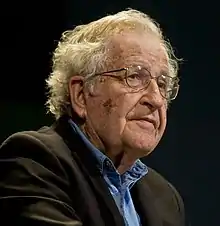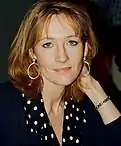A Letter on Justice and Open Debate
"A Letter on Justice and Open Debate", also known as the Harper's Letter, is an open letter defending free speech published on the Harper's Magazine website on July 7, 2020, with 153 signatories,[1][2][3] criticizing what it called “illiberalism" and cancel culture spreading across society, and denouncing President Donald Trump as "a real threat to democracy".[3]
Background
The letter was spearheaded by Harper's and New York Times writer Thomas Chatterton Williams.[4] He was initially worried that its timing might cause it to be viewed as a reaction to the George Floyd protests, which he viewed as a legitimate response to police brutality in the United States, but ultimately decided to publish it, citing various recent events such as the firing of David Shor. Shor was fired after public backlash from tweeting a paper by Omar Wasow, which argued nonviolent protest was more effective at shaping public opinion.[2] Vox writer and signatory Matthew Yglesias faced pushback from a transgender coworker, who criticized the letter for being signed by "several prominent anti-trans voices". This included Rowling, who attracted controversy for her comments on transgender issues.[2]
In total, around 20 people contributed to the contents of the letter.[4]
Signatories generally did not know who had signed the letter until it was published.[3] At least one, Jennifer Finney Boylan, retracted her endorsement, but others, such as Katha Pollitt, reaffirmed their support for the letter's contents despite disagreeing with some of the signatories on other issues.[5]
Signatories
The letter is signed by 153 people, mostly scholars and writers. They include academics from Harvard University, Yale University, Princeton University, and Columbia University.
Notable signatories include linguist Noam Chomsky; fiction writers J. K. Rowling, Salman Rushdie, Margaret Atwood, Martin Amis, John Banville, Daniel Kehlmann, and Jeffrey Eugenides; world chess champion Garry Kasparov; political scientist Francis Fukuyama; feminist Gloria Steinem; cognitive psychologist Steven Pinker; journalists Fareed Zakaria, Malcolm Gladwell, Anne Applebaum, Ian Buruma, David Frum, and David Brooks; composer Wynton Marsalis; writer and former Leader of the Liberal Party of Canada Michael Ignatieff; political theorist Michael Walzer; economist Deirdre McCloskey; poet Roya Hakakian; surgeon Atul Gawande; music journalist Greil Marcus; and social psychologist Jonathan Haidt.
Full list
- Elliot Ackerman
- Saladin Ambar
- Martin Amis
- Anne Applebaum
- Marie Arana
- Margaret Atwood
- John Banville
- Mia Bay
- Louis Begley
- Roger Berkowitz
- Paul Berman
- Sheri Berman
- Reginald Dwayne Betts
- Neil Blair
- David W. Blight
- Jennifer Finney Boylan
- David Bromwich
- David Brooks
- Ian Buruma
- Lea Carpenter
- Noam Chomsky
- Nicholas Christakis
- Roger Cohen
- Frances D. Cook
- Drucilla Cornell
- Kamel Daoud
- Meghan Daum
- Gerald Early
- Jeffrey Eugenides
- Dexter Filkins
- Federico Finchelstein
- Caitlin Flanagan
- Richard T. Ford
- Kmele Foster
- David Frum
- Francis Fukuyama
- Atul Gawande
- Todd Gitlin
- Kim Ghattas
- Malcolm Gladwell
- Michelle Goldberg
- Rebecca Goldstein
- Anthony Grafton
- David Greenberg
- Linda Greenhouse
- Kerri Greenidge (Later withdrawn)
- Rinne B. Groff
- Sarah Haider
- Jonathan Haidt
- Roya Hakakian
- Shadi Hamid
- Jeet Heer
- Katie Herzog
- Susannah Heschel
- Adam Hochschild
- Arlie Russell Hochschild
- Eva Hoffman
- Coleman Hughes
- Hussein Ibish
- Michael Ignatieff
- Zaid Jilani
- Bill T. Jones
- Wendy Kaminer
- Matthew Karp
- Garry Kasparov
- Daniel Kehlmann
- Randall Kennedy
- Khaled Khalifa
- Parag Khanna
- Laura Kipnis
- Frances Kissling
- Enrique Krauze
- Anthony Kronman
- Joy Ladin
- Nicholas Lemann
- Mark Lilla
- Susie Linfield
- Damon Linker
- Dahlia Lithwick
- Steven Lukes
- John R. MacArthur
- Susan Madrak
- Phoebe Maltz Bovy
- Greil Marcus
- Wynton Marsalis
- Kati Marton
- Debra Mashek
- Deirdre McCloskey
- John McWhorter
- Uday Mehta
- Andrew Moravcsik
- Yascha Mounk
- Samuel Moyn
- Meera Nanda
- Cary Nelson
- Olivia Nuzzi
- Mark Oppenheimer
- Dael Orlandersmith
- George Packer
- Nell Irvin Painter
- Greg Pardlo
- Orlando Patterson
- Steven Pinker
- Letty Cottin Pogrebin
- Katha Pollitt
- Claire Bond Potter
- Taufiq Rahim
- Zia Haider Rahman
- Jennifer Ratner-Rosenhagen
- Jonathan Rauch
- Neil Roberts
- Melvin Rogers
- Kat Rosenfield
- Loretta J. Ross
- J. K. Rowling
- Salman Rushdie
- Karim Sadjadpour
- Daryl Michael Scott
- Diana Senechal
- Jennifer Senior
- Judith Shulevitz
- Jesse Singal
- Anne-Marie Slaughter
- Andrew Solomon
- Deborah Solomon
- Allison Stanger
- Paul Starr
- Wendell Steavenson
- Gloria Steinem
- Nadine Strossen
- Ronald S. Sullivan Jr.
- Kian Tajbakhsh
- Zephyr Teachout
- Cynthia Tucker
- Adaner Usmani
- Chloé Valdary
- Lucía Martínez Valdivia
- Helen Vendler
- Judy B. Walzer
- Michael Walzer
- Eric K. Washington
- Caroline Weber
- Randi Weingarten
- Bari Weiss
- Sean Wilentz
- Garry Wills
- Thomas Chatterton Williams
- Robert F. Worth
- Molly Worthen
- Matthew Yglesias
- Emily Yoffe
- Cathy Young
- Fareed Zakaria
Reaction
The letter drew mixed reactions on social media.[3] In an opinion piece for CNN, John Avlon praised the letter, writing, "Demonizing principled disagreement does not advance liberal values—it fuels negative partisan narratives that Trump's reelection depends on. It can distract from actual purveyors of hate, and a sitting President who advances policies that are often racist or homophobic as well as anti-immigrant."[6] In another CNN opinion piece, Jeff Yang criticized the letter, writing, "it's hard not to see the letter as merely an elegantly written affirmation of elitism and privilege", and that the signatories "in the face of resultant backlash, dismissed rebuttals and positioned themselves as beleaguered victims of the current culture, turning their support for open debate and free expression into an example of stark hypocrisy or sly gaslighting.[7] Public Seminar criticized the letter's timing, stating that the letter primarily blamed cancel culture for disrupting free and open conversations at a moment during the George Floyd protests when it was becoming clearer what influence institutions had in controlling debate.[8]
A response letter, "A More Specific Letter on Justice and Open Debate", organized by the lecturer Arionne Nettles and signed by over 160 people in academia and media, critiqued the Harper's letter as a plea to end cancel culture by successful professionals with large platforms while excluding others who have been "cancelled for generations". The response named specific incidents in which black people were silenced by their institutions.[9][10] Multiple signatories omitted either their names or institutional affiliations, citing fear of "professional retaliation".[11]
Kerri Greenidge later asked for her name to be retracted from the letter, which was done.[3]
References
- "JK Rowling joins 150 public figures warning over free speech". BBC News. July 8, 2020.
- Schuessler, Jennifer; Harris, Elizabeth A. (July 7, 2020). "Artists and Writers Warn of an 'Intolerant Climate.' Reaction Is Swift". The New York Times. Retrieved July 9, 2020.
- Chiu, Allyson (July 8, 2020). "Letter signed by J.K. Rowling, Noam Chomsky warning of stifled free speech draws mixed reviews". The Washington Post. Retrieved July 9, 2020.
- Schuessler, Jennifer; Harris, Elizabeth A. (July 7, 2020). "Artists and Writers Warn of an 'Intolerant Climate.' Reaction Is Swift". The New York Times. Retrieved July 20, 2020.
- Srikanth, Anagha (July 8, 2020). "Harper's Letter condemning 'cancel culture' draws debate on social media". The Hill. Retrieved July 9, 2020.
- Avlon, Opinion by John. "Bari Weiss, Andrew Sullivan and the Harper's letter: the case for open debate". CNN. Retrieved September 8, 2020.
- Yang, Jeff. "The problem with 'the letter'". CNN. Retrieved September 8, 2020.
- Hemmer, Nicole. "Why the Harper's Letter Got It Wrong". Public Seminar.
- Schuessler, Jennifer (July 10, 2020). "An Open Letter on Free Expression Draws a Counterblast". The New York Times. Retrieved July 12, 2020.
- Roberts, Mikenzie (July 13, 2020). "Harper's letter and response signed by Northwestern academics". The Daily Northwestern. Retrieved July 18, 2020.
- "A More Specific Letter on Justice and Open Debate". The Objective. July 10, 2020. Retrieved July 12, 2020.
External links
- A Letter on Justice and Open Debate, Harper's Magazine

